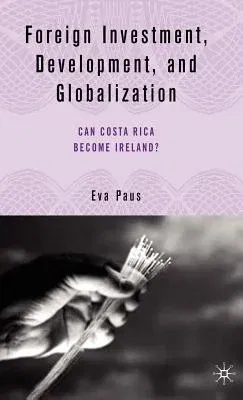E Paus
(Author)Foreign Investment, Development, and Globalization: Can Costa Rica Become Ireland? (2005)Hardcover - 2005, 13 October 2005

Qty
1
Turbo
Ships in 2 - 3 days
In Stock
Free Delivery
Cash on Delivery
15 Days
Free Returns
Secure Checkout

Print Length
268 pages
Language
English
Publisher
Palgrave MacMillan
Date Published
13 Oct 2005
ISBN-10
1403969833
ISBN-13
9781403969835
Description
Product Details
Author:
Book Edition:
2005
Book Format:
Hardcover
Country of Origin:
US
Date Published:
13 October 2005
Dimensions:
21.69 x
15.39 x
1.91 cm
Genre:
Developing World
ISBN-10:
1403969833
ISBN-13:
9781403969835
Language:
English
Location:
New York
Pages:
268
Publisher:
Weight:
421.84 gm